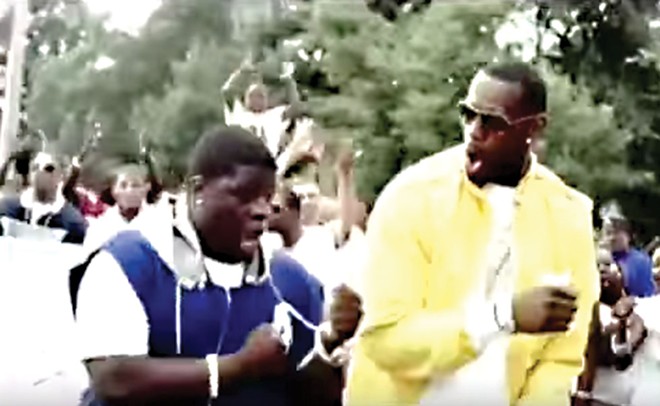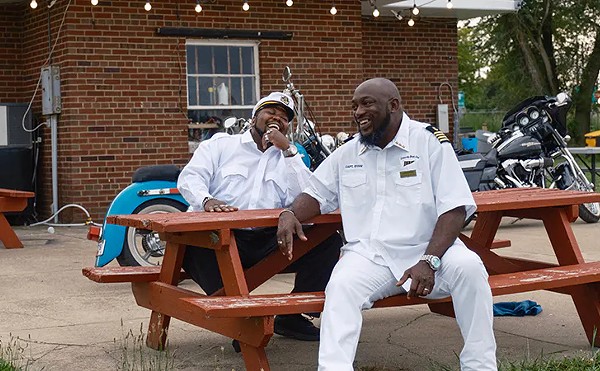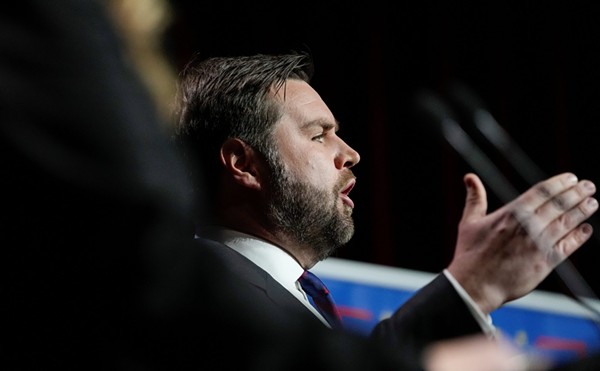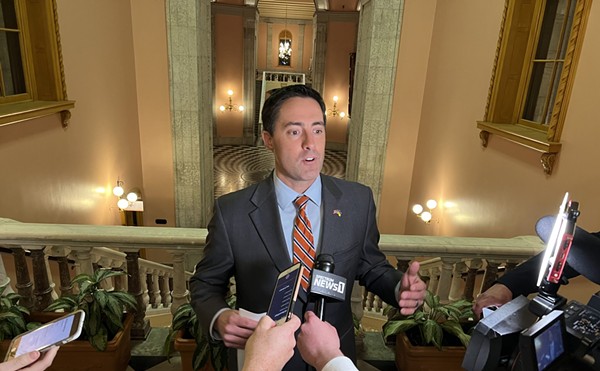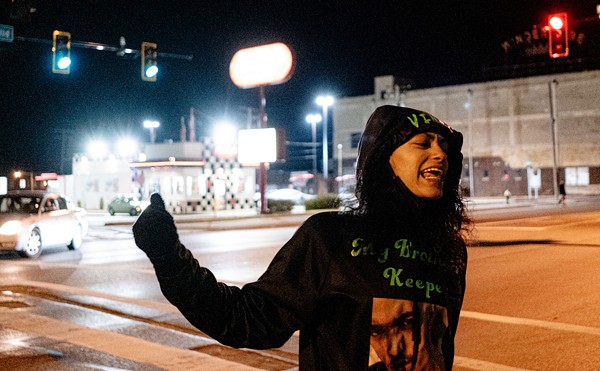
A shivering line snakes out of Moda on a frigid December night in 2005. The controversial Ohio City club — an infamous nexus of dancing and drugs, nuisance and nightlife — would close the next year, its owner indicted on drug and money laundering charges. But in the winter of 2005 it was still a place to be — the crowd hopping, the living large, the muffled bass pulsing through brick walls onto West 25th Street.
An SUV glides up to the curb and a group of men spills out, including four young guys — a wide-eyed, ragtag bunch that looks like they should be strolling through a high school hallway, not into a club.
A promoter waves them to the front of the line, unhooking the rope as they bypass the waiting crowds who probably don't recognize the crew but who would certainly know their voices. Those voices, after all, had been booming out of cars, basement stereos and in gymnasiums across the city that year. They're the Royalty Camp, a mercurial young hip-hop group including Tae 4rm Da 50, Pooh Gutta, RJ Da Fool and charismatic frontman Fat Al, and they were about to get their first taste of the high life.
The group posts up in the VIP section. A promoter leans over and hands a burnt CD in a paper sleeve to DJ Chicago, a local fixture and Z107.9 disc jockey. Chicago cuts the music in the 1,500-person-capacity club and grabs a microphone.
"I need Cleveland to stand behind this song," he says. "This is gonna be a hit."
Chicago presses play. A slow, intoxicating two-note bass clef piano lick punctuated by hand claps begins, expanding into a booming, stripped-down rhythm of claps and bass knocks. A viscous, sing-song voice begins to rap:
It's the Fat Al / and I'm from the SLAB
Hands rise up on the dance floor. The verse rounds the corner for the chorus, and it seems like the whole city is singing along:
I done came down, I done came down
Chicago played it again. And then again. And again. "It was crazy. The track wasn't even mixed down, and it definitely wasn't mastered. It was the original, first cut," he says, still a bit in awe 12 years later, "People had the same reaction every time I played it. It was like they were hearing it again for the first time."
DJ Chicago spun "Came Down" 10 times in a row. Sitting in the VIP section, the big-boned 17-year-old took it all in.
He'd arrived. He done came down.
Over a decade has passed since that evening but, on a rainy day this past April, Fat Al's memory is vivid as he recounts that night at Moda. "We're 16, 17, we don't know what's going on," he says, sitting in the kitchen of a home on a quiet side street in Maple Heights. "We're not smoking or drinking; it's a natural high."
Now 29 years old, he's slimmed down since the days when his nickname was christened, when hopping in a car might've caused its rims to scrape. But he still carries a wide frame, a boyish face, and a dazzling smile that peeks out as he reminisces about the song and what happened since.
What happened was exactly what DJ Chicago predicted: It was a hit. And as DJ Chicago prescribed, Cleveland stood behind the song as it came to a popular and financial crest by the summer of 2007. Al would solidify a business relationship with Rich Paul, then a LeBron James advisor and nascent industry player. "Came Down" would appear on the wildly popular 2007 edition of the Madden video game. He would ink a deal with Atlantic Records. He'd record a video for the song with LeBron James himself, embark on a tour and perform with rap's biggest names.
And then it all fell apart.
***
Fat Al was born Aljaray Gaston on Cleveland's northeast side, growing up on the strip just north of East Cleveland between Glenville and Collinwood that kids dubbed "The Clair."
He was raised by his grandmother, who juggled a full house of responsibilities: three siblings on his mother's side plus dozens of other grandchildren staying with her at any given time. He was distant from his eight stepsiblings on his father's side, even more so after his dad died when Al was 10. His mother was in and out of his life.
"I used to lie and say that my mother lived in Florida when I was little," Al recalls. "I felt embarrassed about my mother being in the streets my whole life and not being there for me. But it made me at the same time. It made me a stronger me. It made me an entertainer. I had to dodge the tomatoes."
Al's penchant for deflecting attention found a natural outlet as class clown at Glenville High School where he'd get tough love when he acted out.
"We've gotta suspend you because you did some bullshit," Al says, characterizing the staff's approach. "'But we love you, we're gonna feed you. You want a corned beef sandwich?' I was always spoiled with love in the 'Ville."
Much of that stemmed from a relationship with Ted Ginn Sr., the legendary coach of Glenville's powerhouse football and track teams and the father of one of Al's close friends, Ted Ginn Jr. Coach Ginn knew all about Al's turbulent home life and took him under his wing, even inviting him over for Christmas. Al conditioned with the team, rode on the buses to games and meets. Al's other foundation was a neighborhood crew that called itself the S.L.A.B., a nod to Houston's rich "swangin'" culture that had found a second home in Northeast Ohio. Characterized by candy-painted, big-rimmed American luxury cars — Lincolns, Cadillacs and Oldsmobiles from the '60s and '70s — swangin' was a coming-of-age prerequisite in the Clair.
"It was our first taste of independence, getting our Ls and our whips," Al says. "We knew all the hot music and we bumped it."
Al had some of the charisma of the guys they were listening to, plus a sharp tongue and a melodic style of rapping. He first combined them into a little neighborhood chant, titled "Hol' Up," whose popularity snowballed among the social circles orbiting the popular football and track teams. At the Glenville talent show in December of 2004, in front of a thousand kids, he got up on a stage to perform for the first time.
“People had the same reaction every time I played it. It was like they were hearing it again for the first time.” — DJ Chicago
tweet this
"Everyone was standing up on their seats and started yelling it," he remembers. "Glenville High School, the week before winter break ... that was my start."
Over the next few weeks Al flipped the chant into a mixtape of freestyles called The Fat Album, burned them onto 10 CDs, and sold them for $3 to $5 a pop in his first week back at school in January. He used the profits to buy a 100-pack of blank discs.
"And there wasn't no looking back," he says. "I was selling it on the street, CDs in envelopes type shit, standing on the corner selling 'em like I was selling dope. And I saw people start respecting me."
***
As Al enjoyed his school-ground notoriety, he was introduced to a Glenville freshman named Ralph Worley Jr. — known as RJ — who recorded music in a slipshod, DIY studio.
"Studio, aka my bedroom," RJ says, laughing. "Our first couple mixtapes were terrible quality; those were recorded in my closet."
Al recorded his second mixtape, The Fat Ality, in the bedroom studio. He rapped over popular contemporary instrumentals but tossed a beat and verse from RJ himself at the end of the project. RJ, 15, had first made beats on a PlayStation video game before becoming "savvy with the software shit" and upgrading to Pro Tools, an amateur producer's Pandora's box. The very first beat he made was inspired by the moody progressions of keyboard licks in "5 On It," the 1995 Bay Area anthem by Oakland duo Luniz. He slowed them down, transposed them into mahogany piano notes, and stripped everything else back, leaving just handclaps, a shaker and a bass kick so powerful it shook his bedroom walls. Al was addicted to it.
"He would always come over and be like, 'Play that beat for me!'" RJ says. "He would always freestyle the chorus — 'I done came down, I done came down' — but we didn't record it."
As Al's first two mixtapes created a buzz on the Clair, people got interested in working with him and RJ. In East Cleveland, a young rapper named Pooh Gutta and his crew caught wind; near Collinwood, a rapper who went by Tae 4rm Da 50.
"A month later," Al says, "there's literally a hundred people at RJ's house. They've formed this little clique and they were like, 'Al, you in it?' I was like, 'I'm doing my own thing; y'all is crazy.' But it just ended up kinda going. And I went."
Two months into his fledgling music career, this was the first of many moments where Al — then a 17-year-old teeming with talent but lacking on guidance — felt backed into a decision that was essentially already made for him. He doesn't admit resentment toward anyone, but there are wistful cracks of lamentation.
"It definitely was organic," Al says of the group's genesis. "But at the same time, my shit was moving, and they saw my movement, and it was by myself. And they said, 'We gotta get with Al.'"
The clique was whittled down to four guys who called themselves Royalty Camp. Over the next few weeks they recorded a 13-track tape, taking turns laying bars in RJ's closet recording booth and embracing the local rap style of "cappin" — boasting about things you don't have or haven't done. They rhymed about jewelry, million-dollar deals, 28-inch rims on Jaguars, hoping the verses, those bedroom incantations, would rap themselves into reality.
On the last day of recording, Al asked RJ to put on the "5 On It" beat that he'd been mumbling to for months. What they recorded, in one take, became the first version of "Came Down." An ode to the SLAB, Al rapped about his friends, their old school whips that sat on enormous chrome rims, and the incomparable sense of cool that came with riding down the street, doors open, blasting music. Sure, he slurred some lines and words, but they liked the track's rawness. Plus, they didn't expect all that many people to hear it anyway.
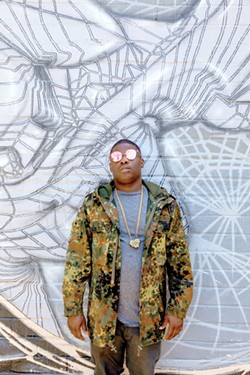
"It was a bullshit-ass version," RJ says. "That shit really blew because we didn't go into it, like, we're about to make a fucking hit record and get this shit on Madden. We were thinking small, like, we're 'bout to burn this shit onto some CDs and sell these CDs and get some Jordans."
Sell CDs they did: "Came Down" quickly became a neighborhood hit, then picked up underground steam as CD-R discs were passed around, landing in the hands of the city's tastemakers.
"As a DJ, my ear is to the street, and I was hearing it in cars, on the street," says DJ E-V, then a burgeoning 20-year-old trying to spin at parties before becoming one of the city's mixtape kings. "It wasn't mixed, but it was so catchy. It was like an infection — it was everywhere. It was like a fucking Martian landed on Earth."
"I can only imagine it was like being in New York City in 1997 when 'It's All About the Benjamins' dropped," says Mick Batyske, a staple of the Cleveland hip-hop scene who worked as the in-arena DJ for the Cavs during LeBron's early years and was then known as Mick Boogie. "It was ubiquitous. We played it a lot during games. It was a local anthem."
***
Before Rich Paul was Rich Paul, mega agent with the world's best basketball player as a client, he was Rich Paul, a grassroots entrepreneur who met LeBron while flipping throwback jerseys out of the trunk of his car.
Like Al, Paul grew up in Glenville — they went to the same barbershop at East 112th and St. Clair and had met years earlier when Al was in middle school — and counted Ted Ginn Sr. as a mentor. They weren't close but they were familiar, and by the time "Came Down" was being passed around, Paul was firmly in LeBron's inner circle.
Royalty Camp had scrambled to record new material, knocking out hits in Phatty Banks' Hough studio for a mixtape called Royal Rumble. The mixtape featured "We Ballin'," a colossal finger-snapping, buzzy synth-saw hype track that elevated the group, helped the group draw appearances like at Moda, and opening sets like for Harlem rapper Juelz Santana. The small purses — $500 or so — were nice, but it wasn't about the money for Al; it was about the connections. He was introduced to Ducky Smallz, a local artist with far stronger ties to Rich Paul than Al laid claim to. While Paul knew of Al, he hadn't known about the group's breakout.
"Rich always saw the potential in Al," says RJ. "Our shit was in high schools. Rich didn't know how big we were until we started to do little shows, packing them bitches out and rocking them. Eventually, he came around."
It was a different stratosphere than what the group was used to. Here was someone who had the stuff they rapped about.
"When Rich came to Al, Al came to me to pick me up," RJ says, recalling their first official business meeting. "Rich was in the 2007 Cadillac Escalade, and we went to fucking McDonald's. Rich pulls out all $100 bills and paid for our meal with [one of them]. It had to come out to maybe $15, tops. They didn't have change, so he was like, 'Keep it.' I was like, 'Who the fuck is this dude?'"
Paul pitched the idea of forming a label through which they could release their music. After turning down some other local labels and a few meetings, Al found himself operating under Paul's umbrella in an undefined business arrangement.
"To be honest, I don't know what Rich was," Al says. "He just oversaw my business at that point. He was wearing all types of hats, from manager to jeweler. I was living a grown man's life, but I still was a boy. Rich gave me guidance about how to be a man."
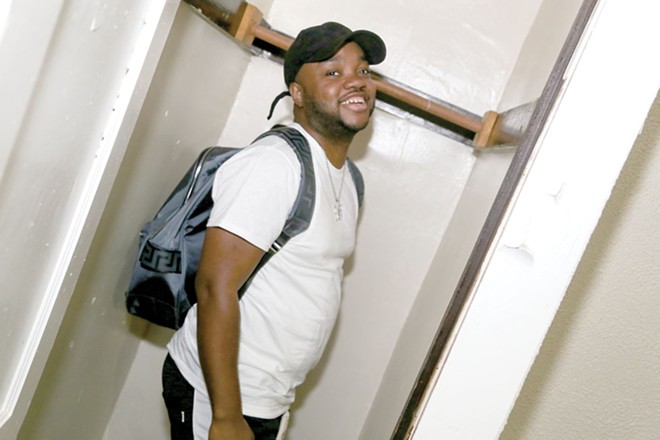
They hit the ground running. Al and the rest of the Royalty Camp started spending time at Rich's home in Hudson and, within a few weeks, Rich had leveraged connections and the buzz of "Came Down" into a meeting with Atlantic Records in New York City. Al claims that within an hour, after playing just "Came Down" and one beat from RJ, Atlantic was ready to sign him. This claim was repeated (more or less) by Rich Paul on a later mixtape of Al's, saying: "Most n*ggas don't get a deal in two hours ... but Al Fatz the next n*gga on deck."
By March, Rich had a deal on the table from Atlantic. Al had been recording for barely a year.
***
But Al's movement stumbled out of the gate. The day after Al returned from the Atlantic meeting, a close friend of the group, Anthony Gordon, was shot and killed in the Flats after a show where Al had been slated to play, but bailed at the last second.
"I went sharp off of being a teenager with no support system straight into this, then one of my biggest supporters and friends just got killed at a show for me," Al says. "I was dazed."
Just weeks later, another wrench got tossed into the gears. Atlantic received cease-and-desist notices from Bill Cosby and his attorneys. Apparently "Fat Al" was too close in name to Cosby's trademarked Fat Albert character.
"Fuck Bill Cosby," Al barks. "That's the answer to all those questions." Unable or unwilling to fight over the moniker, Atlantic prodded Al to change his name. The two sides finally agreed on Al Fatz. It was a minor hiccup though; the bigger problem was the layers of the deal itself.
Paul's budding label, co-created with LeBron and Leonard Brooks, a Clevelander who managed Atlantic R&B singer Gerald Levert, was christened Dreamlife. Al found himself in the basement below layers of middlemen with no experience in business or contract law, which made negotiating fuzzy.
"Rich was supposed to manage them, but then it turned into a production deal," says Phatty Banks, "It was a sticky situation. It's murky, man."
Banks, a veteran producer and sound engineer, recorded the second version of "Came Down" and was instrumental in the group's development during this era.
While he knew that Paul was in the best position to help Al, he found it confusing that the relationship morphed from managerial — where Al and Rich would have effectively represented a single entity — to a label/artist relationship, where Al and Rich remained separate, even competing, entities in a negotiation.
"Everything changes when one dollar is made, because how you gonna divide that dollar up?" Banks asks. "That's when the music industry's not fun any more."
And while RJ caught a respectable check from the deal, he can't help but think that Al may have jumped the gun in signing with Atlantic, especially concerning the rest of the Royalty Camp.
“He would always come over and be like, ‘Play that beat for me!’ He would always freestyle the chorus — ‘I done came down, I done came down’ — but we didn’t record it.” — RJ Da Fool
tweet this
"There were never rifts about Al being the leader or the one with the record deal," RJ says. "We've had our hardships, but we're brothers. Brothers fight and brothers make up. I always wanted the group to keep doing what it was doing, but Al signed that deal and that lightweight messed it up for us."
Pinning down the decision processes and release schedules — basically any sort of detail — is difficult 10 years after the fact. Part of that is the industry, but part of that has to do with the time this was all unfolding, the difference between the analog world of hard copy or erasure and the digital world of fossilized minutiae. There are no Twitter timelines to search for promo tweets, or archived Facebook event pages, or easily discoverable YouTube interviews at every major radio station. It's a treasure hunt through the internet's awkward middle-school phase: bootleg MP3 websites, long inactive Myspace pages, and pre-Soundcloud music sharing platforms. It's squinting at thumbnail-sized photos taken on Nokia brick phones, newsletters created in MS Paint, and scanned copies of old Billboard magazines. It's relying on the memories of kids who were 16 years old at the time.
But what's clear, at least to Al, is that without legal representation or even a guardian involved in the deal-making process, he ended up in the dark.
"When you got people who know the world better than you do at the time, what can you do? All I could do was make music," Al says. "I didn't know what was going on. It was going through Rich and I just kind of let Rich do whatever."
Just like when Royalty Camp first formed and Al went along, the Atlantic deal just ended up kinda going ... and Al went.
***
Contractual issues aside, this period really was a boon for everyone involved. With Al's star rising, "Came Down" began spreading out of Cleveland and into the national spotlight.
"I was traveling a lot at that time, and wherever I would go, people would know of Ray [Cash] and Al," says Mick Batyske. "It was fun playing local music because, for the first time, it wasn't out of obligation. It was because it worked for a mass audience."
"I gave it to my guys in Miami," DJ Chicago says. "And when I got to South Beach, I'm seeing Bentleys playing 'Came Down.' I was like, 'Yeah, this is a hit.'"
Paul parlayed the national success into another deal, snagging an eleventh-hour $15,000 licensing deal for "Came Down" to appear on the upcoming Madden 2007 video game. It almost didn't happen, as negotiations dragged through the summer. Paul, barely 25 years old at the time, seemed to be shooting from the hip himself.
"Rich said it: 'I don't know the business, I just know how to connect dots,'" RJ says. "Music wasn't his first thing; it was just some shit he did. He just saw some kids from his neighborhood in the city doing some positive shit and he wanted to help. We didn't know what the fuck we was doing. We just knew we had a nice record on our hands and it was a talented group of li'l kids that caught the ear of the city, which is hard to fucking do — to this day."
The lack of a hip-hop infrastructure — beyond a radio station that followed orders from HQ and vestiges of the Bone-Thugs-N-Harmony ecosystem — made the road even more difficult.
"I don't think any of us really knew what we were doing," says DJ E-V, reflecting on this era, "There were no people from Cleveland to tell us, you know? In Atlanta and New York and L.A., there are people who are O.G.s who can step in and help. In Cleveland, there was nobody. You're kind of guessing what to do."
***
So when Paul invited Royalty Camp to move into his Hudson house permanently, it seemed as good an idea as any. But with a toddler and a girlfriend at home, and a lucrative gig working for LeBron, he knew he needed to give context to his role. While he was serious about the endeavor — building a home recording studio, bringing them with him when he bought a bigger place in Solon — RJ says Paul sat the whole crew down in his kitchen and told them, "Whether y'all pop or not, my lifestyle is not gonna change. This is not my bread and butter."
Royalty had support, but they had to be self-motivated, and they were. Pooh, Tae, and RJ were making music every day, and by that summer they'd released their album, Dedication to Anthony Gordon.
Al was busy — getting pulled up onstage to perform with Yung Joc, playing dates on morning show host Russ Parr's Bus Tour. He began working with Grammy-nominated Roc-A-Fella signees Young Gunz and picked up a Lil Wayne verse. He'd paired up with fellow SLAB member Chip Tha Ripper for their first hit collaboration, "Get It Girl," produced by emerging Cleveland producers the Kickdrums. He was traveling with LeBron and Rich, playing shows in tandem with Cavs away games across the country. Atlantic flew Al down to Miami to work at The Hit Factory, pairing him with various powerhouse producers to crank out songs for his upcoming album.
By early 2007, Al was firing on every cylinder. LeBron snapped him up alongside Houston rapper Paul Wall to host his Sprite All-Star Weekend party at the Bellagio in Vegas. Atlantic finally unveiled "Came Down" for wide release, using a third and final recording of the track. With the Cavs on their way to an NBA Finals appearance, Atlantic dropped it as a single on May 1 and sent Al and the Royalty Camp on a 30-city promo tour.
"We were going to the cities at the height of when shit was going on," RJ says. "Bike Week on Myrtle Beach, Memorial Weekend in Miami." It was that first night at the Moda, amplified tenfold across the country.
By the time they'd got home, Sprite had dropped the collab with Paul Wall ("Main Attraction"), and Rich had surprised Al by setting up a video shoot for "Came Down" the day after they arrived.
The video — shot between Al's neighborhood, his barbershop and a club downtown — is triumphant, youthful, and unapologetically Cleveland. LeBron even showed up, dancing alongside Al in some shots and letting the DreamLife crew borrow his Rolls Royce. Atlantic talked about making a big push for it — MTV, BET, a hefty promotion budget — and in behind-the-scenes footage from the day, amidst the joyous atmosphere, Al told everyone to look out for his album, The Unexpected, under Atlantic and DreamLife in the early fall.
Everything was moving. And then, for once, Al didn't go along.
***
By November, a profile featuring Al and Paul indicated that "negotiations between the local company and [Atlantic] are in limbo," and that Paul "has doubts about the strength of Atlantic's commitment to his artists."
The way Al describes it, though, he just kind of ... bailed.
Without attorneys to represent him at the negotiations between Atlantic and DreamLife, Al felt like he was losing too much control, too fast.
"Who was really there to make sure my shit straight?" he says. "I didn't really have the resources to make sure everything was right. I didn't have the representation to even say, 'This guy deserves a $500,000 or million-dollar deal.' I didn't really have a lawyer to go up against these big corporations. When there's nobody really fighting for you, you end up taking scraps."
"Scraps" was $150,000, 60 percent of what Al says was a $250,000 advance, with the other 40 percent going to DreamLife. The final publishing deal was never signed, he says. Al left it on the table and walked away.
"I didn't like the percentages at the time," he says. "I had all the control when I was rocking with Chicago and going to the Moda and selling CDs. But in this game you have to give up a lot to get where you want. After the deal went, I just disappeared on everybody because it felt weird."
***
Al had gone from high school talent shows to the Billboard charts in two years; something else would surely come through, he assumed.
After Dreamlife dropped his collab mixtape with Chip, Double Trouble, in late November, Al moved out of Rich's spot and back to The Clair. Royalty Camp had effectively disbanded in the wake of the separation.
"It wasn't mixed, but it was so catchy...It was like a fucking martian landed on earth." — DJ E-V
tweet this
"I wasn't really around anybody except RJ," he says. "I was just going to pick up beats from people and disappearing, coming up with shit, like damn, I'm still creative."
Al wrote and laid vocals for a song he called "To The Floor" over a beat he grabbed from RJ. The result was a bright, synth-driven poolside club jam. He took the recording, stored it on his computer, and sat on it until a surprise phone call from Paul. "Me and Rich weren't really conversing at this point," Al says, sort of glossing over the fact that he'd bounced on the deal that Rich had set up for him. "Then he hit me and he was with Polow Da Don and he wanted me to come to L.A."
"See, this is why I fuck with Rich," RJ says. "Because he looked out, no matter what. Rich will put you in position to win."
In 2008, Paul and LeBron were in production on More Than A Game, the documentary about LeBron and his high-school teammates in Akron. They'd tapped a producer named Polow Da Don to help out with the soundtrack. Polow's production credits were staggering, including hit singles for the Pussycat Dolls ("Buttons"), Fergie ("London Bridge" and "Glamorous"), and Usher ("Love in This Club"). And to top it all off, he was a huge fan of Al's.
"I played him "To The Floor" myself over my computer," Al says. "Nobody knew I had those new songs — not Rich, not nobody." Polow loved it.
"Al called me asking about the files and said that Polow Da Don wanted the record," RJ says. "I was like, 'Word?'" RJ joined Al in Los Angeles along with JP, another Cleveland staple now known as Earl St. Clair. The three of them crashed at the studio for over a month, grinding on new music.
"We didn't even have a hotel; we were staying in the studio," RJ says. "We weren't just working on that song: We were just making beats, all types of shit."
Polow bought the rights to the song and filled the verses with his famous friends. "He went and got Drake on there, made Lloyd sing on it, Rich Boy did his thing on it, and left me on it," Al says, "I have a song with Lloyd, Rich Boy and Drake that I wrote. RJ made the beat. And, uh ... That ended up not going through."
Polow was planning on saving it for Rich Boy's next album, likely to be dropped as its lead single. Months of waiting turned to years. "2010 comes, and everybody's hyped about this national record that I'm supposed to have. Then that shit didn't even come out. They said it got leaked."
"Maybe some cease-and-desist was sent out, maybe someone stole the record and put it out," RJ says. "I just know it wasn't rolled the way it was supposed to have been rolled out. There was no promotion: It just came out.
"That was supposed to have been it," RJ says. "After 'Came Down,' that was the next big thing for me. And when that shit didn't work out, I was like, 'What the fuck is going on?' This is Rookie of the Year Drake; Drake when he's first poppin'. He's just coming out and everybody's checking for him, and that shit didn't work? I was like, 'Damn, that was another shot.'"
For a sense of the scale of this missed opportunity, here's a bit of context on the collaborations between the other featured artists on the track. The previous song that Drake and Rich Boy made together was on the mixtape that first splashed Drizzy into the mainstream, Comeback Season. Drake and Lloyd went on to make a song for Drake's critically acclaimed second mixtape So Far Gone. The next single they collaborated on was 'BedRock,' the Young Money posse cut that hit No. 2 in the U.S., charted in seven countries, and introduced the mainstream to Nicki Minaj.
Al was right there.
"That song could definitely have been the one," says Steph Floss, who played the leaked versions in the club and on the radio, even without label backing.
DJ E-V agrees. "That song would go," he says. "Everyone loved it, and in Cleveland, that was a really big song. But when you stop pushing something, it just stops."
Al felt crushed, and jaded.
"I just felt foolish. It wasn't even about feeling depressed, I just felt like we could do this shit, we should do this shit," he says. "At that point, I knew there was some weird shit going on. I don't need to be looking forward to none of this shit. I need to be in control of all my music and everything."
***
This story stings even more with the knowledge that Al's disappearance basically couldn't occur in today's Soundcloud-centric, social media-driven, DIY rap industry where fans have direct access to the artist's music. But Al's timing meant that his fanbase was among the last wave to be largely dependent on large corporate structures: physical CDs, radio stations, record labels, and MySpace, which was just the wrong horse in the race.
At one point or another, it seems like everyone involved in Al's rise has thrown around blame in vague frustration. There's certainly a version of this narrative that finds Paul and the Dreamlife ecosystem at fault for the unfulfilled potential in Al's career. Signing to Atlantic so quickly, negotiating against the artist you're supposed to be nurturing: There were a few potential red flags.
There's a compelling argument that Al undercut his own career at its most promising point. He did bail on a quarter-million dollar deal, after all, one which today he says could have worked.
“They were ahead of their time. If that same movement had been happening now, they would’ve been super stars.” — Steph Floss
tweet this
Accusations of straight-up laziness have been lobbed against him as well, that getting caught up in the glamorous lifestyle of Rich and LeBron was more important to him than grinding in the studio. In a subliminally charged video from 2010, Rich lauded Tae's work ethic, but — without naming Al outright — railed against someone he'd worked with who got "spoiled" after private jets and fancy dinners.
Even RJ admits that Al might have gotten "a little too lax" after the early heights. "He was working, but he was seeing too much, being around people who had more money than him and thinking he could live that life. Getting signed is just the beginning," RJ says, "Once you get that, you gotta work 10 times harder."
Phatty Banks is a bit more magnanimous with his appraisal. "It came so fast," he says. "The record took off, and everybody was trying to catch up to it, including Al. The situation was probably very overwhelming for him, to go from sleeping on the floor at his friend's house to being front row at the Cavs game and at LeBron's house."
And this seems to come closest to the real root cause: a confluence of circumstances.
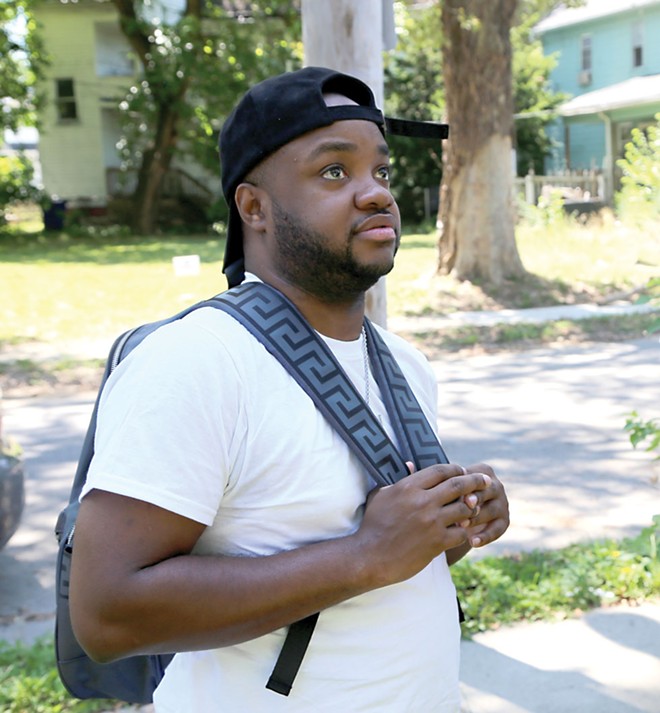
The overwhelming youth that made this movement bold and fearless also lacked veteran guidance and know-how. The dearth of infrastructure meant that everyone who supposed to be helping Al was also trying to make money off him while learning how to navigate the business themselves. The relative obscurity of Cleveland's music industry made it a blank canvas for its artists, but made it that much more difficult to get noticed or gain traction.
"They were ahead of their time. If that same movement had been happening now, they would've been super stars," Steph Floss hypothesizes. "They would've been Migos. They would've been Rae Sremmurd."
"It's just the nature of the beast," Mick Batyske offers. "The music industry is a fickle, complicated machine."
It's certainly no coincidence, however, that Cleveland artists began getting national buzz with more consistency in the years directly following Al & Co.'s pioneering rise: from Kid Cudi's Brooklyn approach to Chip Tha Ripper's steady Midwestern spread to MGK's homegrown punk-rap.
"What we're talking about 10 years ago, that was a boom," E-V says. "And from there, it trickled into all these other talented artists being able to become something special. If it wasn't for that, it might've gone a different way. Someone had to be the first guy. That was the start of something great."
***
Al and Royalty Camp are widely and rightly considered local greats. But for many of Al's supporters, it doesn't necessarily have to be in the past tense. Al's still got it, they say, if he lets himself be helped.
"If he has the right team now, he'll go off, he'll be good. He's such a talented artist. Could you imagine if Rich had him now?" says E-V. "That'd be amazing."
"Being around him, the way he performs, the way he interacts with the crowd, he knows how to do that shit. For real, Al is a star," says RJ, who still makes music part-time. "It's just about him being around the right people who can put him in the right situation to win and taking that direction."
Al took a break from rapping to focus on singing from 2010 to 2013, even popping out a few catchy tunes that gained some local steam. He linked with a live band and began rapping again in 2013, but it was tough to regain traction in the city. Al was caught in a paradox: Locally perceived as wildly successful, but unable to reliably book shows — and therefore earn an income — in markets besides Cleveland and Columbus. He couldn't move past being the "Came Down" rapper.
So last summer, he packed up and moved to Los Angeles for a fresh start. He reconnected with kids from The Clair who'd ended up in Southern California and found a thriving music community. "I'll never turn my back on the city," Al says. But, "L.A. is really arms open. I can do whatever I want."
In October, he landed in the studio with 100STACCS, a producer and engineer who's scored recent hits for emerging artists like Lil Yachty and Joey Fatts, and re-recorded "Hol' Up" — the chant he performed at the Glenville High School talent show in December of 2004. His new album, Pre Game — under Al's newly formed label, Unlimited Recordings — will drop this year.
"I'm ready to move forward," he says. "I'm ready to leave the past behind me."

